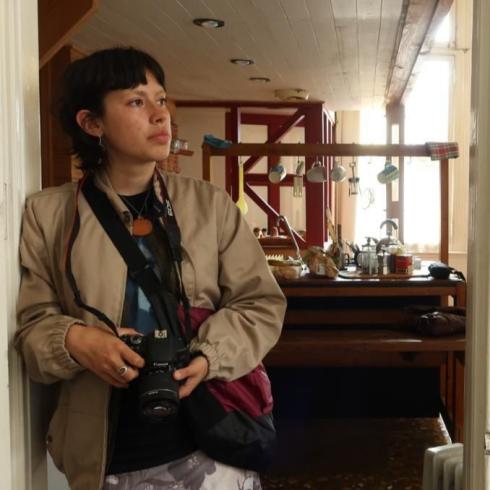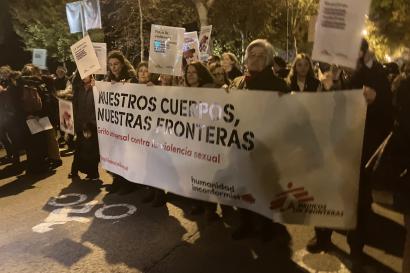Being queer, nonbinary, and a lesbian in Spain, and particularly in Madrid, has been a deeply affirming experience. Spain has a rich history of LGBTQ+ activism and a vibrant queer culture, but living here has also revealed how much work remains to be done to ensure equity and inclusion within the community, especially for those who identify as trans or nonbinary. As someone who exists at the intersections of these identities, I’ve found Madrid to be a city of contrasts—both progressive and imperfect, but undeniably alive with queer joy and resilience.
Spain’s LGBTQ+ history is both inspiring and complex. Under Franco’s dictatorship (1939–1975), queer people faced severe repression. Homosexuality was criminalized, and countless individuals were imprisoned, silenced, or forced into hiding. The end of the dictatorship marked a turning point, as Spain transitioned to democracy and began embracing human rights reforms.
In the decades that followed, Spain emerged as a leader in LGBTQ+ rights. In 2005, it became one of the first countries in the world to legalize same-sex marriage, setting an example for progressive legislation globally. Today, cities like Madrid host world-famous events like *Orgullo Madrid* (Madrid Pride), which is not only a celebration but also a platform for activism, bringing together millions of people to advocate for equality.
Madrid’s barrio of Chueca is widely recognized as the heart of the city’s LGBTQ+ community. Walking through its streets, you’ll see rainbow flags adorning balconies, bars and clubs catering to queer patrons, and bookstores that center queer literature. Chueca is a haven for many, but like many "gayborhoods" worldwide, it has faced challenges such as gentrification, which has priced out some of the very people who helped shape its identity.
Beyond Chueca, the spirit of queer community thrives in Lavapiés, a historically multicultural neighborhood known for its radical politics and grassroots activism. This is where you’ll find feminist bookshops, queer-friendly art spaces, and activist hubs that challenge mainstream narratives about queerness and gender.
What is FLINTA? & building inclusive spaces
A growing focus within Spain’s queer community is creating spaces for FLINTA people—an acronym for *mujeres, lesbianas, intersex, no binarias, trans, y agénero* (women, lesbians, intersex, nonbinary, trans, and agender individuals). These spaces prioritize marginalized identities within the broader LGBTQ+ movement, recognizing that queer liberation cannot be achieved without centering those who are most vulnerable to systemic oppression.
FLINTA spaces, events, and organizations in Madrid have been instrumental in fostering solidarity and visibility. Groups like *La Pluma Colectiva* organize meetups, workshops, and protests that are explicitly inclusive of lesbians and trans women, challenging cisnormative and patriarchal structures that can sometimes dominate mainstream queer culture.
As a nonbinary lesbian, I’ve found these spaces particularly meaningful. They offer a sense of belonging that goes beyond acceptance, emphasizing shared experiences and the need for intersectional approaches to activism. Attending events like zine-making workshops or queer feminist panels has not only deepened my understanding of local activism but has also given me tools to advocate for these values in other contexts.
Spain has seen increasing visibility and advocacy for trans rights in recent years. While the country passed a groundbreaking law in 2023 allowing trans individuals to self-determine their gender without medical intervention, trans people—especially trans women—still face discrimination and violence. Grassroots organizations like *Euforia* and *Fundación Daniela* are at the forefront of trans activism, working to ensure that these legal advancements translate into real-world safety and opportunities. Social media campaigns and public education efforts aim to dismantle harmful stereotypes, while queer-friendly events frequently highlight the importance of centering trans voices in the fight for equality.
Even within the LGBTQ+ community, lesbians and trans women have historically been underrepresented or marginalized. The creation of dedicated spaces for these groups is vital—not only for fostering solidarity but also for challenging harmful hierarchies that privilege cis gay men. In Madrid, collectives like *LesMad* and *TransAfirme* have made incredible strides in creating spaces where lesbians and trans women can share their experiences, build community, and advocate for their rights. These spaces often blend activism with celebration, highlighting the joy that comes with reclaiming identities and histories that have long been erased.
For me, being part of these spaces has been empowering. They remind me of the strength that comes from solidarity, the beauty of queer resilience, and the importance of fighting for a community where everyone—regardless of their gender identity or sexual orientation—can thrive.

Layla Santiago
An avid hiker and rookie musician, I love being outdoors and jamming on the guitar whether solo or with friends. Having Mixtec, Mexican, and Polish heritage has allowed me to appreciate diverse cultures and perspectives.





